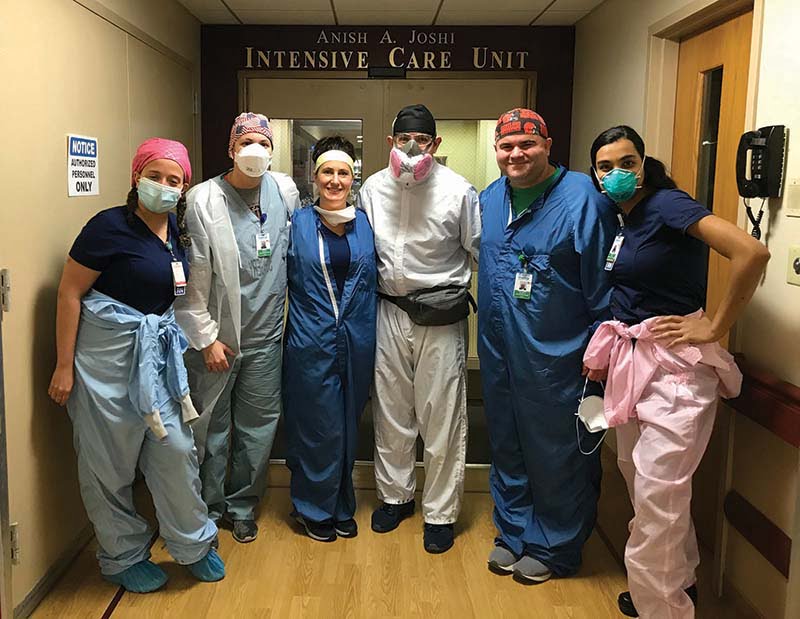
by Jill Ragar Esfeld
jill.esfeld@theleaven.org
OLATHE — In early March, Julio Garcia, a member of St. Paul Parish here, was planning his wedding.
He and his fiancee were to be married on June 6, and were expecting almost 400 guests.
It was the happiest time of his life.
Two months later, the wedding was canceled and Garcia was headed to New York, the epicenter of the COVID-19 pandemic, to work in intensive care.
A traveling nurse and member of the American Association of Critical Care Nurses, Garcia felt an obligation to help those most in need during this crisis.
But the decision to go to St. John’s Riverside Hospital in Yonkers, New York, wasn’t easy.
“I’ll be honest,” he said. “There was a night I couldn’t sleep. I was anxious, I was nervous.
“But I’ve been doing ICU now for three years. And I just felt if they needed help, especially in an ICU setting, I wanted to help out.
“So I went.”
Garcia’s mother contacted St. Paul Church and asked for a blessing for her son, which pastor Father Michael Hermes was happy to give.
Before he left for New York, Garcia’s mother gave him a rosary; it would become a treasured means of getting him through the hardships ahead.
What he found in New York were brave, resilient people overwhelmed with heartbreaking realities.
At St. John’s, specialty wards had been turned into coronavirus units, and operating rooms converted into ICUs — but both were inadequately equipped for critical care.
“Some of these nurses were working in other specialties,” said Garcia. “In one week, they had to get a crash course in ICU and then care for ICU patients.
“Normally, the ICU nurses have two patients to one nurse; some of these nurses were taking five critical- care patients.”
Needless to say, he was greeted with open arms.
“They’ve been so welcoming,” said Garcia. “They’ve been so nice, so thankful. They needed the help and so they really appreciate everybody that came.”
Garcia’s purpose was to relieve the workload, but he found just being a good listener was almost as important as being trained in critical care.
“A lot of these nurses have been carrying weight on their chests,” he said. “They’ve been seeing patients, cheering for them, and sometimes — when the outcome’s sad — they need to be able to talk, to cry, to let it out somehow.
“I just listen to them. I feel that’s my main role, just supporting nurses, relieving them and just letting them vent emotionally.”
Because he is fluent in Spanish, and Yonkers is a Hispanic neighborhood, Garcia has become a resource for communicating with families and friends of COVID-19 patients.
“That is a sad thing,” he said. “Unfortunately, [visitation] is really limited and sometimes these patients do pass away without there being any family in the room.
“And we have to call families and tell them their relative has passed away. It is really hard.
“It can be emotionally draining.”
Garcia said the hardest aspect of his journey is missing his family and home. But prayer has helped him remain positive.
“To be away from my family, to see people dying — it’s definitely made me pray more,” he said.
“My mom gave me this rosary, and I’ll be honest, I haven’t prayed a rosary in over a year,” he continued. “But I’ve started to do that now.
“I’ve gotten so comfortable and so fortunate to have all these blessings that I kind of forget to be thankful and to pray about them.
“This experience has definitely made my faith stronger.”
As the country reopens, Garcia shares a fear common among health professionals that there will be a second wave of coronavirus.
“That’s definitely something everybody at the hospital talks about,” he said.
The best way to show our gratitude to health providers is to do everything in our power to keep that from happening.
“Practice social distancing,” said Garcia. “Wear face masks, especially around people who are vulnerable.
“I think that’s what everybody at hospitals wants — especially now that they’re going to open the country back up.
“Be safe and be smart.” Garcia looks forward to coming home soon — and, in 2021, making new plans for his wedding.






